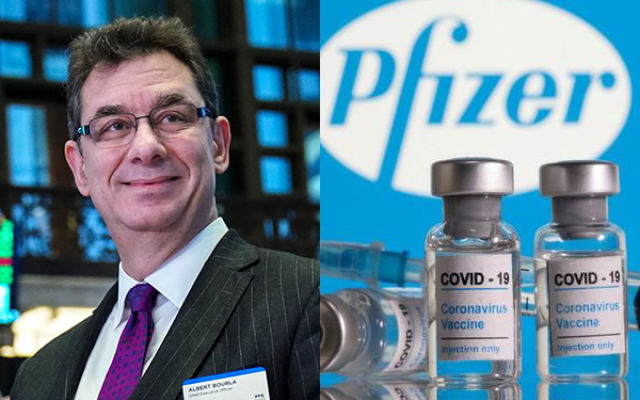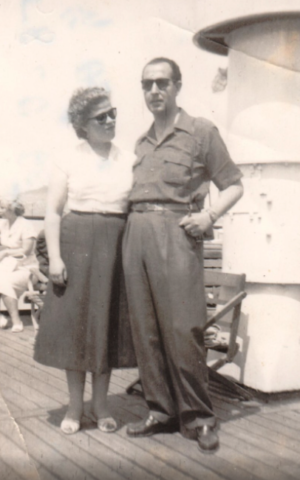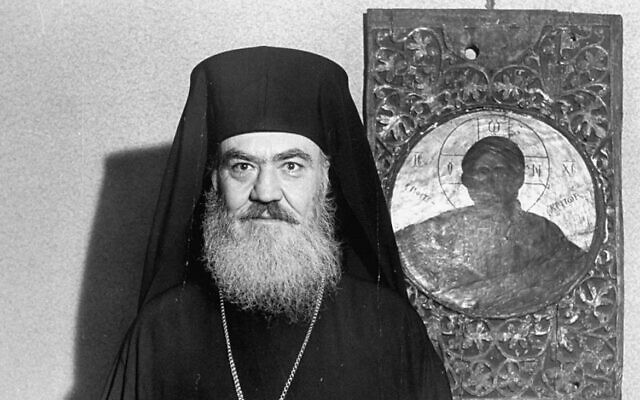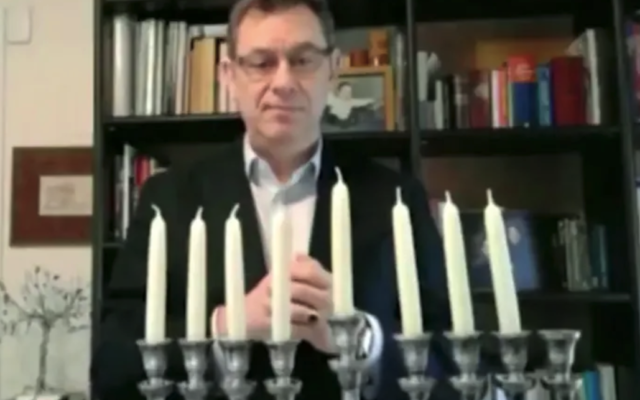Pfizer CEO’s Jewish Past Inspired Vaccine Work
Family of top pharmaceutical leader Albert Bourla miraculously survived the Holocaust in Salonika, Greece.

Albert Bourla, who as chairman and CEO of Pfizer pharmaceutical company helped develop the lifesaving COVID vaccine, owes much to the valiant efforts of others to save the lives of Greek Jews during the Holocaust.
During an online discussion Thursday sponsored by The Museum of Jewish Heritage in New York, Bourla described how his mother and father were among the very few to survive the Nazi occupation of Salonika, the ancient Greek city where he was born.
Of the more than 50,000 Jews who lived in Salonika, only about 2,000 survived World War II. Speaking to interviewer Robert Krulwich, a former NPR radio journalist, Bourla said that his father and uncle – two brothers – escaped the initial roundup in the Greek city and escaped to Athens.

The police chief in Athens, Angelos Evert, they learned, was clandestinely issuing fake IDs which non-Jewish names to thousands who were desperate to escape the transports to Auschwitz. It was a moral act rooted in the efforts of the Greek Orthodox church leaders to protect the Jews of the country. Not only did the two men get new papers but they got a job and worked for two years in a city that was filled with Nazi soldiers.
“The people that gave them the fake ID,” Boula related, “they also found them a job in the Red Cross warehouse. That was a full-time job. But they were not getting paid. But they had access to food.”
The woman who was later to become Bourla’s mother was also saved in miraculous circumstances. According to Bourla, she was about to be executed by the Nazis along with a number of other Salonika Jews. She was lined up against a brick wall facing a machine gun just a few feet away when she and another woman were picked up by two Nazi soldiers with an order for her release, and put on a truck.
“And as the truck was leaving the place,” Bourla said, “they heard the sound of the machine guns. And it was, for me, unreal. But everybody else was dying and they were sitting there just three minutes ago.”
Her freedom had been bought by a bribe paid by her wealthy non-Jewish brother-in-law who had personally followed up with Salonika’s top Nazi SS officer to make sure she would survive.
Beginning in 1943, most of the community’s Jews were transported to the death camps in Poland. Despite the brave efforts by the Greek Orthodox archbishop in Athens to save them, the community that had existed for over 2,000 largely came to an end.
Three of Bourla’s brothers miraculously survived, and one-by-one they found each other in the old city. The reunion began with a scribbled note to one of the men, according to Bourla.

“They gave him an address. When he rang the bell, they opened the door and suddenly they see the brother that they thought is dead. And of course, they hug and kiss and he says, ‘I’m the only one. Everybody’s dead.’ And then a third one came back. That gave them hope that maybe others will come back. Unfortunately, they didn’t. But we were already an extremely lucky family to have three of the family members that went to Auschwitz coming back.”
According to Bourla, many of those who survived went to Palestine or America or to Athens, Greece, to begin a new life. Bourla’s father at one point showed his son a visa that he had received to immigrate to America, but he stayed in Salonika, met and married his mother Sara and raised his family there.
Bourla was educated at the university in Salonika and after graduation, joined Pfizer in Greece to begin his steady climb through the executive ranks of the multinational corporation.
He is generally credited with driving the company to develop the two-shot COVID vaccine in record time.

During Thursday’s interview he said he owed his many accomplishments and his recent success to the lesson he learned from his parents. They emphasized the importance of living a positive life even if the past is filled with so much darkness.
“But they never spoke to me about revenge. They never told us that you should hate those that did that to us. The way that their stories were always ended were a celebration of life. ‘Look at us. We’re alive. We were almost dead and now we are alive. Life is wonderful.’”
Bourla, who could have dwelled only on his Jewish past, said he has always looked to his Jewish future.
“What is important is that we move on. We feel proud for our heritage. We demand the respect of the ‘other,’ but we are moving on.”



comments